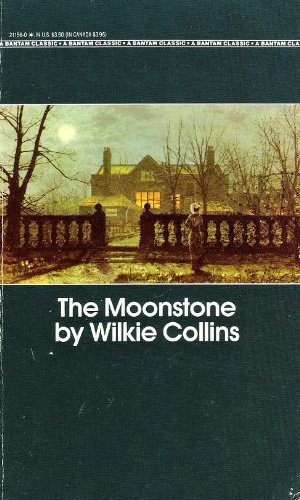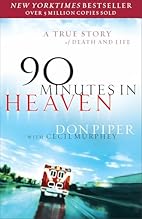
I bought this book because it was recommended by some of my friends. I tried to start it a few months ago, but distractions kept me from being able to immerse myself in it at that time, and I find that immersion is required for many of the 19th century English classics (Austen, and Dickens, for example).
This is a Bantam Classic paperback in gently used condition. The cover is a little worn and the pages are slightly yellowed with age (3rd printing, 1986). They are not marked nor dog-eared.
The Moonstone is considered the first modern detective novel, but Collins himself called it "A Romance". Certainly, it had romance in it, but the major plot revolved around the solving of the mysterious disappearance of a large diamond which had been presented to a young lady on her 18th birthday.
The story begins many centuries before, with a large golden-yellow diamond set in the forehead of an Asian Indian idol, the moon god. It is constantly watched by three Brahmin Indians, succeeding in turn by three more in each generation. It is their duty to always know where the diamond is, and if possible, to return it to its rightful place. Its turbulent history includes a curse, many wars and invasions, desecration and theft. Finally, another invading army, the British, sack and plunder the castle, and when it's all over, the diamond has been removed to England.
Two years after the Moonstone has been discovered missing from the sitting room of Miss Rachel Verinder, a family member and their lawyer decide it is worthwhile to have a written record of all the events of that evening and following. Thus we have the story, written as reports from the principals, beginning with the family's elderly and faithful servant, the butler and steward, Mr. Gabriel Betteredge. Reports are also given by Miss Clack, a "poor relation" spinster lady who is much concerned with missionary endeavors and is given to writing in excessively flowery language; by Mr. Bruff, the family's solicitor, mentioned above; by a cousin and suitor of Miss Verlinder, Franklin Blake; by physician's assistant Ezra Jennings; by the famous London detective, Sergeant Cuff; and by the family doctor, Mr. Candy.
The Epilogue consists of three more reports: by Sergeant Cuff's man, by a ship captain, and by Mr. Murthwaite, a man known to the family, who is well traveled in Asia and in Europe.
Of all the characters, I liked Mr. Betteredge best. (I'll have to re-read Robinson Crusoe now!) I also liked Ezra Jennings and Sgt. Cuff, and I learned to like Rachel Verinder. She began as a spoiled teenager, but grew to a wise, forgiving, and loving young lady. Of course, the most pitiable was poor Rosanna Spearman, who loved in vain.
There are several suspects who had motives for stealing the diamond, and I confess I was unable to guess who was the guilty party.



